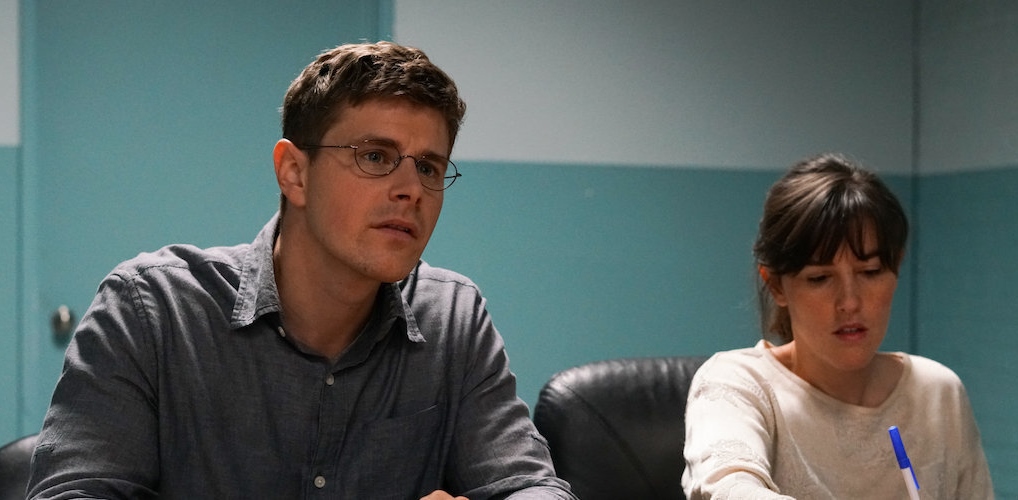
Denys Arcand is a French-Canadian filmmaker who has over the years written and directed several Oscar-nominees (Jesus of Montreal, The Decline of the American Empire) and one Best Foreign-Language Picture Oscar-winner (The Barbarian Invasions). His films tend to be small, character-based and set in the Canadian province of Quebec. They often deal with pertinent issues like death, religion, and sex, usually through conversations and discourse, laced with subtle humor. While the director’s previous few films haven’t made as strong an impact, The Fall of the American Empire is a return to form, gently examining and wittily critiquing the world’s obsession with wealth and its cost on society.

Pierre-Paul Daoust (Alexandre Landry) is a struggling, socially awkward writer and intellectual. Frustrated by his inability to find success in life, he has been forced to make ends meet by working as a courier delivery driver. After coming upon the scene of a robbery and shootout leaving bodies and bags of cash behind, Pierre-Paul can’t resist the urge to take the money and run. Hoping that it will improve his prospects, his first transaction procures the services of a high-class call girl, Aspasie (Maripier Morin). As police begin to investigate and question the protagonist, he approaches ex-con Sylvian ‘The Brain’ ‘Bigras (Rémy Girard) to help him hide the money from authorities.

As mentioned, the filmmaker’s work is generally low-key, meaning that viewers shouldn’t expect an action picture or thriller. Instead, the screenplay emphasis is on humor and subtle commentary. The opening scene in which Pierre-Paul attempts to explain his lack of good fortune, inability to raise himself above his class standing, and the current, distressed state of the planet utilizes some amusing quips and a valid observation or two. There is also some fun to be had at the actions of the initially altruistic hero after he comes into his fortune. Sylvian Bigras is a stand out, stealing scenes and adding several chuckles as he attempts to help guide Pierre-Paul how to conceal his sudden riches.

The concept allows for some interesting background themes as well. Although it is never explicitly stated, the presence of money (or lack thereof) influences all of the character’s lives and actions to some degree… even the cops step up their game when it is revealed that half of the recovered funds will likely go directly into the force’s coffers. Of course, despite what viewers may think upon the introductions of the various leads, the story soon challenges some of the preconceived notions and assumptions made about them.

And the film really springs alive during the final third as a plan is crafted to try and launder the funds. It leads to more remarks as characters note the pay inequality present in the modern society (one disillusioned figure even notes that the CEO at their place of employment earns 287 times as much money, an indefensible wage disparity). Their proposed scheme feels incredibly authentic and well-researched as it plays out. And the sequence effectively builds up some tension as the police close in. Perhaps some of the interest also lies in the fact that while a fictional tale, it cunningly displays how wealthy criminals manage to hide illegal activities, avoid paying taxes and stay in positions of power. Overall, there’s a lot more going on here than what initially meets the eye, and it’s remarkable that a movie ultimately focused on a financial transaction is this entertaining.

Viewers would just be wise to understand that the movie does take a while to get going. There are a lot of little subplots that develop slowly, and the pacing is leisurely… frankly, the picture meanders at times. And one might also be expecting a little more anger and fury from its characters given the circumstances. But then again, this is a Denys Arcand film. Thus, it is more inclined to have the exasperated leads express their opinions and verbally challenge concepts than start an actual revolution (although a character does jokingly mention it towards the close).
Obviously, if you’re situated to the right on the political spectrum, you’re simply going to hate everything about this movie (after all, the truth hurts sometimes). However, patient viewers looking for an eccentric, low-key foreign caper with a soft-spoken but opinionated slant will find something to appreciate. After tackling religion, death and sex, Denys’ The Fall of the American Empire astutely delivers a fun excursion that also serves as a critique of money and the more crooked individuals listing themselves among the top 1%.


